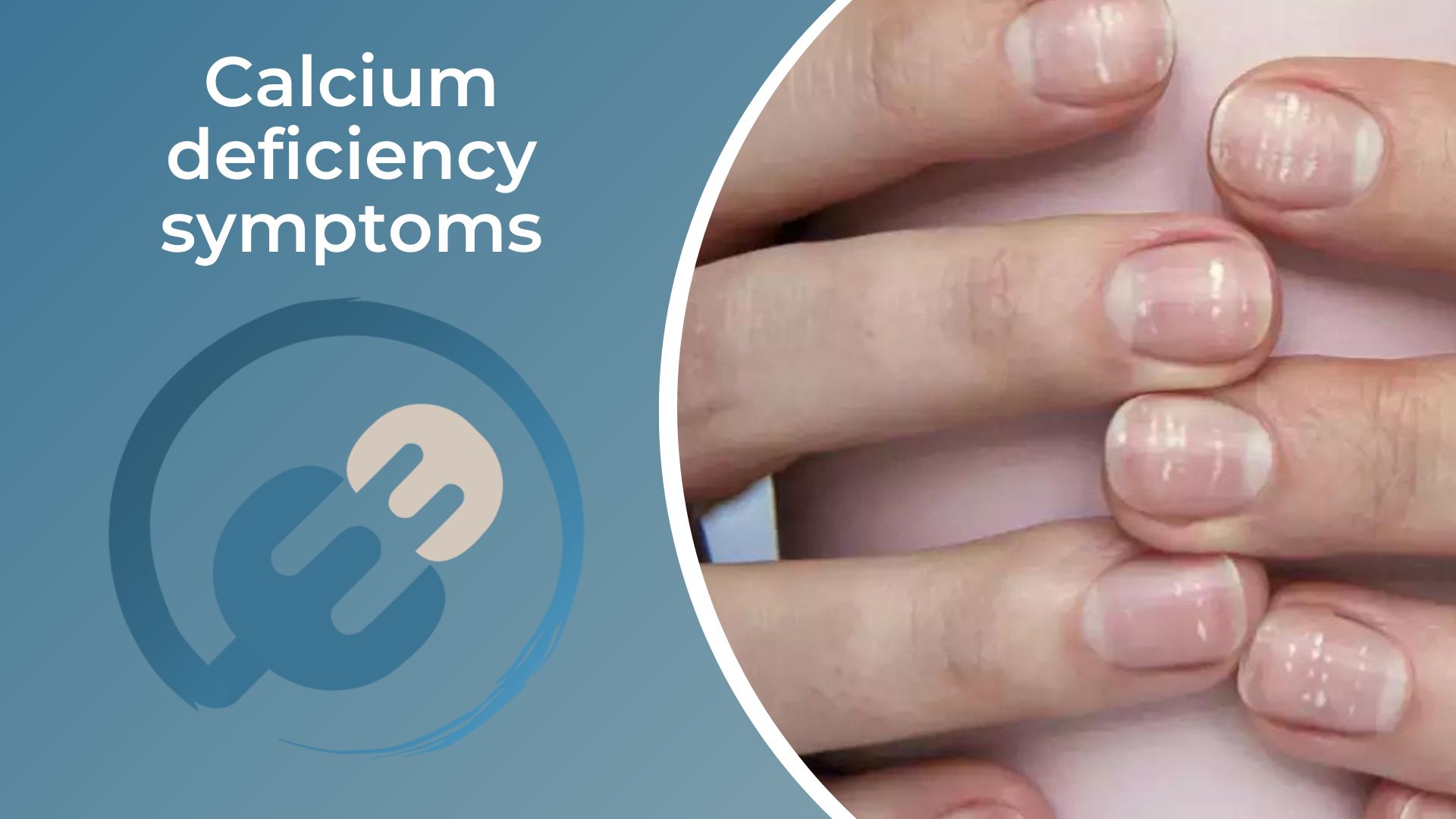Calcium is an essential mineral for the human body and plays a key role in many bodily functions. Without adequate calcium intake, symptoms of deficiency can begin to appear.
In severe cases, calcium deficiency can lead to serious health complications. It’s important to recognize the signs and take steps to ensure you’re getting enough of this vital nutrient in your diet.
This blog post will discuss some of the most common symptoms associated with calcium deficiency so that you can be aware and take action such as calcium supplements if necessary.
What is Calcium Deficiency (Hypocalcemia)?

Calcium deficiency, or hypocalcemia, is a condition in which the body does not have enough calcium to function properly.
This can be caused by various factors including malnutrition and poor absorption of nutrients, deficiencies in vitamin D (which is important for calcium absorption), medical conditions such as thyroid disorders and parathyroid disorders, and certain medications such as diuretics and antacids.
Without adequate calcium intake, symptoms of deficiency begin to appear. These can range from muscle cramps, spasms and twitching, tingling or numbness in fingers, toes or face, depression and confusion to more severe effects like hallucinations.
Meanwhile, other signs of calcium deficiency are brittle nails, dry skin and easy fractures.
In order to prevent calcium deficiency, individuals should ensure that they are getting enough calcium in their diet.
Food sources of calcium include dairy products (milk and cheese), dark leafy greens (such as spinach), legumes (such as peas and beans), nuts (such as almonds) and fish (such as salmon).
Additionally supplements such as calcium carbonate or calcium citrate may be taken if dietary sources are insufficient. Furthermore, it is important to also take vitamin D supplements with K2 because vitamin D helps the body absorb calcium better.
If an individual experiences severe symptoms due to low levels of calcium then intravenous injections may be necessary in order to replenish their body’s supply quickly.
It is also important to identify any underlying medical conditions that could be contributing to the hypocalcemia so that they can be treated appropriately.
Overall it is essential for individuals to take adequate steps in order to prevent hypocalcemia by ensuring they have sufficient dietary intake of both calcium and vitamin D through food sources or supplementation.
In addition it is important for them to rule out any underlying medical condition that could be causing the deficiency so that suitable treatment can be provided accordingly.
Hypocalcemia: Causes, Symptoms, and Treatment

Calcium deficiency, also known as hypocalcemia, is a condition in which the body does not have enough calcium to function properly. The symptoms of calcium deficiency can vary depending on the severity of the deficiency and can include:
- Muscle cramps, spasms, and twitching
- Tingling or numbness in fingers, toes, or face
- Depression
- Confusion
- Hallucinations
- Muscle weakness
- Brittle nails
- Dry skin
- Easy fractures
Causes of hypocalcemia can include:
- Malnutrition or poor absorption of nutrients
- Lack of vitamin D
- Certain medical conditions such as kidney disease, thyroid disorders, and parathyroid disorders
- Certain medications such as diuretics, antacids, and glucocorticoids
Treatment for hypocalcemia typically involves increasing calcium intake through diet or supplements, and correcting any underlying medical conditions or medications that may be causing the deficiency.
Your doctor may also recommend vitamin D supplements, as vitamin D is needed for the body to absorb calcium. In severe cases, intravenous calcium may be needed.
Calcium Deficiency: Are Supplements the Answer?
Calcium deficiency, or hypocalcemia, is a condition in which the body does not have enough calcium to function properly.
Without adequate calcium intake, symptoms of deficiency can begin to appear, such as muscle cramps, spasms and twitching, tingling or numbness in fingers, toes or face, depression, confusion and hallucinations.
These symptoms can be severe and can lead to serious health complications if left untreated.
The causes of hypocalcemia can be due to a variety of factors including malnutrition or poor absorption of nutrients, lack of vitamin D and certain medical conditions such as kidney disease, thyroid disorders and parathyroid disorders.
Certain medications such as diuretics, antacids and glucocorticoids may also contribute to insufficient calcium levels.
Therefore it is important for individuals to ensure that they are getting enough calcium in their diet. Dietary sources include dairy products (milk and cheese), dark leafy greens (such as spinach), legumes (such as peas and beans), nuts (such as almonds) and fish (such as salmon).
Additionally supplements such as calcium carbonate or calcium citrate are available for those who cannot get enough calcium from diet alone.
Vitamin D is also necessary for the body to absorb calcium so it may be helpful to take supplements with both vitamins D3 and K2.
It is also important to identify any underlying medical conditions that may be contributing to your hypocalcemia so that they can be treated accordingly.
For example thyroid disorders should be treated with medication while vitamin D deficiencies should be addressed through diet modifications or supplementation.
If you are experiencing severe symptoms due to low levels of calcium then intravenous injections may be necessary in order to replenish your body’s supply quickly.
How Much Calcium Do You Need per Day?
Getting enough calcium is essential for maintaining good health, as it is necessary for a variety of bodily functions including muscle contraction, nerve transmission and blood clotting. The recommended daily allowance (RDA) of calcium for adults aged 19-50 is 1,000mg per day.
Individuals aged 51 and over may require a higher daily intake of 1,200 mg per day due to the increased risk of osteoporosis associated with age. Pregnant and breastfeeding women should also aim for an additional 200-300mg per day depending on their individual needs.
It is important to note that certain medications or medical conditions can interfere with the body’s ability to absorb calcium from food sources. For example, individuals taking corticosteroids or antacids may need to take in more calcium than usual in order to maintain adequate levels.
Food sources of calcium include dairy products such as milk, cheese, yogurt and fortified soymilk; dark leafy greens such as spinach and kale; legumes such as beans and peas; nuts such as almonds; fish such as salmon; and fortified products like orange juice and cereal.
Supplements may also be used to increase intake if dietary sources are not sufficient. Calcium carbonate or calcium citrate are two common supplements containing high levels of elemental calcium (the form your body needs).
It is important to note that Vitamin D plays an important role in helping the body absorb dietary calcium efficiently so it may be beneficial to include vitamin D3 supplements along with your calcium supplement regimen.
It is also recommended that you spread out your daily intake throughout the day rather than taking one large dose at once as this can affect how much your body absorbs from each dose.
Taking in small amounts throughout the day helps ensure that your body absorbs all the nutrients it needs while avoiding any potential side effects caused by excessive intake such as constipation or kidney stones.
Symptoms
Extreme fatigue, muscle cramps, tingling and numbness in the fingers and toes are all common symptoms of hypocalcemia.
Depending on the severity, hypocalcemia can also lead to convulsions or even coma if left untreated.
If you think you may be experiencing symptoms of low calcium levels it is important to speak to your doctor as soon as possible in order to identify the underlying cause and determine which treatment option would be most suitable for you.
Knowing the signs of hypocalcemia and understanding how much calcium you need per day can help ensure that your body gets all the essential nutrients it needs for optimal health.
Summary
Calcium is an essential mineral for health and wellbeing, as it plays a key role in the functioning of muscles, nerves, and blood clotting. The recommended daily allowance (RDA) of calcium for adults aged 19-50 is 1,000mg per day, while those aged 51 or over may require up to 1,200mg. Pregnant and breastfeeding women have higher requirements at 200-300mg per day.
Dairy products such as milk, cheese and yogurt are one source of calcium that can be supplemented with fortified products such as orange juice or cereal.
Taking supplements of calcium carbonate or citrate may be necessary if dietary sources are not enough to meet the RDA. Vitamin D3 supplementation can also help increase calcium absorption capabilities in the body.
Hypocalcemia is the medical term for low levels of calcium in the body and can cause extreme fatigue, muscle cramps, tingling/numbness in fingers/toes, convulsions or coma if left untreated.
Medical conditions such as thyroid disorders should be treated with medication while vitamin D deficiencies should be addressed through diet modifications or supplementation.
Intravenous injections may be necessary for severe cases where quick replenishment is needed.
Symptoms of hypocalcemia should be discussed with a doctor as soon as possible to determine the best course of treatment depending on their individual needs.
Knowing how much calcium you need per day can ensure that your body gets all the essential nutrients it needs for optimal health.



